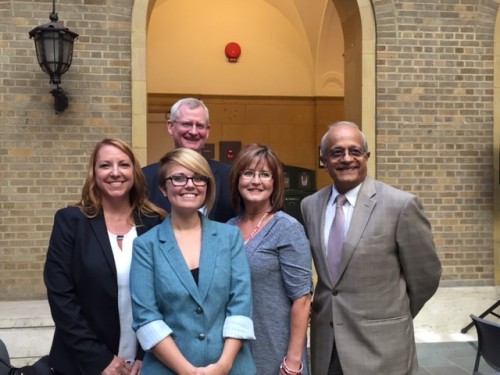
In the photograph, left to right, are Deanna East, associate state leader for health and nutrition; Dr. Jeff Dwyer, MSU Extension director; Erin Powell, MSU Extension health and nutrition educator; Lynette Kaiser, MSU Extension health and nutrition program instructor; and Dr. Sonny Ramaswamy, director of the National Institute of Food and Agriculture. Courtesy of USDA NIFA.
This week, the U.S. Department of Agriculture (USDA) awarded Michigan State University (MSU) Extension the Abraham Lincoln Award for External Partnership for our response to the Flint water emergency. The Abraham Lincoln Award is the most prestigious award presented by the secretary of agriculture. The Abraham Lincoln Award for External Partnership recognizes the exceptional contributions of USDA’s external partners in innovation, productivity and efficiency in program delivery and leverage federal funding to the benefit of USDA’s customers, the external partner and USDA.
MSU Extension received this honor for “successfully responding to stakeholder needs for information about combating the effects of lead exposure to Michigan communities by developing exceptional emergency response with limited staff, time, and budget.”
I had the opportunity to travel with Deanna East, Lynette Kaiser, Erin Powell to accept the award on behalf of our organization and everyone involved in the emergency response. The USDA Abraham Lincoln Honor Award ceremony and reception took place at the USDA Headquarters in Washington, D.C.
Although only three people traveled to D.C. to receive the award on Extension’s behalf, our efforts in Flint were carried out by a large group of committed and passionate staff members. Health and nutrition staff developed programming materials and efforts to address healthy eating to mitigate lead absorption. Children and youth staff worked closely with community partners to develop resources and programs to help parents promote activities that support cognitive development. Greening Michigan and agriculture and agribusiness staff provided gardening and accessing healthy food education and soil tests. And both MSU Extension Communications and ANR Creative helped produce the resources necessary to carry out their endeavors.
We’re looking forward to the opportunity to honor all of our staff members that were part of this vital team at the Fall Extension Conference. Congratulations to the MSU Extension team on your 2016 USDA Abraham Lincoln Award for External Partnership.


